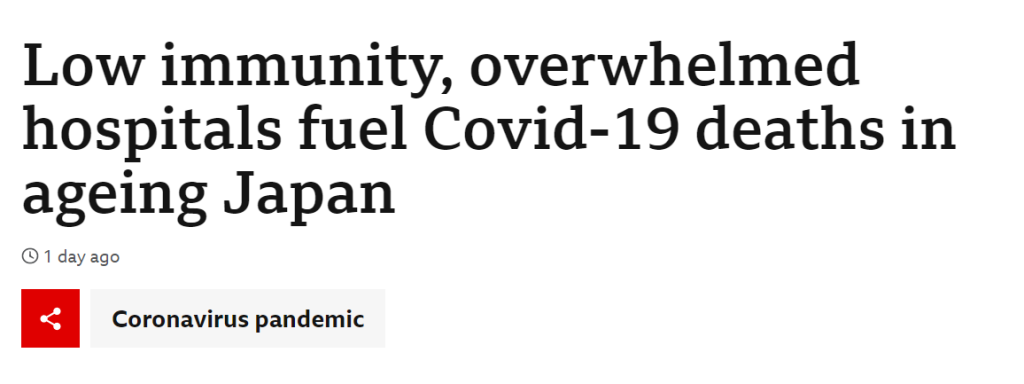
A tragedy in 3 Acts
Act1
In July 2020, the BBC website published an article titled:

The thrust of this was that despite the advanced average age of the population, and despite the fact that Japan “never adopted the energetic approach to tackling the virus that some of its neighbours had” Covid had little impact. This was put down to either genetic differences or some form of pre-existing immunity.
Act 2
Fast-forward 16 months to November 2021 and the BBC were breathlessly celebrating a successful vaccination campaign:

The article describes how, despite a “bungled rollout” the politicians “finally got their act together” leading to the proportion of the population being vaccinated rising from just a few percent in June 2021 to 76% – one of the highest rates in the world – in a matter of 5 months.
Act 3
Moving forward 14 months to the present day however, the latest report on “Japan’s pandemic”, published on 2 February 2023 lays bare the failure of Japan’s policy.

The article describes how Japan went from having one of the lowest covid mortality rates to one of the highest, with mortality trending upwards since the end of 2022.
(This is despite a very high proportion of the population being fully vaccinated and “up to date” with their boosters.)
It describes how it had become “difficult to prevent these deaths by treatment” and that “due to the emergence of immune-escaping variants and sub-variants and the waning of immunity it is getting more difficult to prevent infections”.
The article seems thoroughly confused as to what is going on, suggesting that the current high infection rate was due to lower immunity caused by the prior low infection rate – despite earlier claims that immunity had been “mysteriously” high.
Yasuharu Tokuda, a physician at the Health and Global Policy Institute, noted that the Japanese population’s natural immunity – acquired through infection – had been low before the middle of last year.
The article then tacitly admits the inescapable conclusion – as it has to in the presence of such high vaccination rates – that natural immunity must be superior.
He says natural immunity is stronger than that obtained from vaccination – and so low infection rates have led to low immunity in Japan, which in turn is causing more deaths.
The article remains silent as to the fact that Japan had little impact from covid before the much-lauded vaccine programme, which of course suggests, in fact, that it was the vaccine programme which had a deleterious effect on the previously high immunity levels.
Could this be yet another manifestation of the phenomenon we wrote about last week, that of multiple mRNA injections creating too much of the “wrong” type of antibody, inducing a state of spike protein tolerance which makes fighting off Covid infections harder?
One Emeritus Professor at the Kyoto University, Prof Masanori Fukishima has been making a stand demanding the Ministry of Health release data on mortality in the vaccinated and unvaccinated populations. He was told in August 2022 that they would release the data after two months but then they refused. Now he is suing the government for it. It is unclear how much coverage his actions have had in the Japanese mainstream press but it is certainly worth watching how this pans out.
Keeping infection rates as low as possible then vaccinating rapidly was meant to be the “flagship” approach to dealing with the “pandemic”. The UK’s policy was to attempt to suppress spread while waiting for the miracle of the vaccines to be rolled out. Australia’s strategy was to keep covid out (by border closures and strict case quarantine) and then vaccinate the population before “opening up”.
Yet both these approaches have failed miserably by any measure, including the one used to justify their implementation in the first place, making the entire supporting authoritarian paraphernalia a dangerous waste of time and money with harms to society that will last at least a generation.

